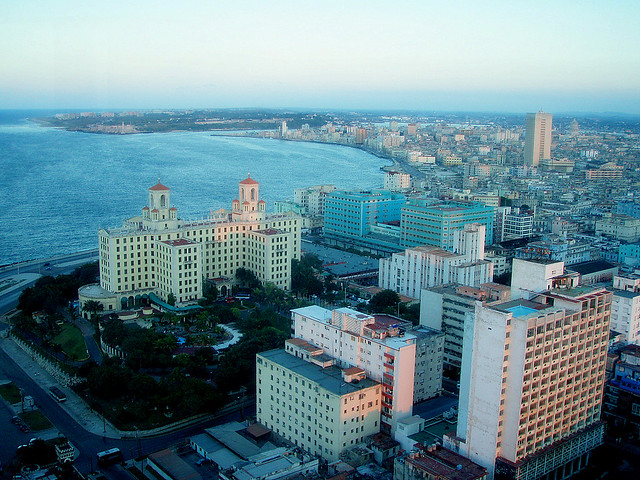The death of Cuba's Fidel Castro offers an early glimpse at how U.S. President-elect Donald Trump will need to balance his pro-growth economic plans and allegiance to business with the hard-line campaign pledges that helped him win the election.
Trump has promised to reverse the improved U.S. relations with Cuba forged by President Barack Obama over the past two years unless the Caribbean nation met his demands for more political and religious freedoms.
Reince Priebus, Trump's incoming chief of staff, reiterated that message on Sunday in an interview on Fox News. Priebus said the U.S. needed "a better deal" from Havana. But to backtrack now on Obama's detente may put Trump, the billionaire businessman, at odds with U.S. companies hoping for a foothold there.
As a candidate Trump simultaneously cast himself as a someone who could create jobs by ushering in a new golden age for U.S. companies, and as a champion for a wide range of groups who felt shorted by the Obama administration's foreign and domestic policies.
Trump now has to walk a line between business executives who see opportunity 90 miles (145 kilometers) from the U.S., and exiled anti-Castro Cubans, who have voted reliably Republican for years. Many Cuban-Americans continued that support for Trump, helping to push him to a win in Florida, a key battleground state.
Florida Senator Marco Rubio, a Cuban-American, said on NBC's "Meet the Press" on Sunday that Fidel Castro's death changes nothing for a country still run by his younger brother. Raul Castro is "not a reformer thinking for the best interest of Cuba long-term," said Rubio, who recently called for "rolling back President Obama's one-sided concessions to the Castro regime." For Trump, "one test is which voice he listens to," said Geoff Thale, program director at the Washington Office on Latin America, a human rights group. "He is and he made his reputation as a business guy," said Thale, who most recently visited Cuba in September.
Obama in October lifted restrictions on importing Cuban cigars to the U.S. for personal use, part of the sixth round of eased sanctions since December 2014. U.S. cruise ships can now dock in Cuba, and U.S. airlines can fly to the island. In October, the U.S. Chamber of Commerce called a round of loosening sanctions "a welcomed step forward in the pursuit of greater opportunity for the U.S. private sector to collaborate with Cuba." Many Americans are keen to visit Cuba and spend money there.
U.S. officials in July made preliminary awards of 20 daily trips to Havana as part of normalizing air links with Cuba for the first time in half a century. U.S. airlines though have requested licenses for nearly 60 daily flights, according to Department of Transportation.
The Farm Bureau, an agricultural lobbying group, said in September that restrictions on sales to Cuba are "placing U.S. farmers and ranchers at a serious disadvantage in this nearby market."

Havana hotels — Photo: Barbara Walsh
"Mr. Trump was brought into Washington on the backs of rural white America and the ex-urban community, which is dominated by agriculture," said James Williams, president of Engage Cuba, a Washington-based lobbying group pushing to end the embargo. "It seems counterproductive that the first thing he would do would be to slap farmers in the face and close a potential market to them."
Cuba's population of about 11.4 million is similar to that of the U.S. state of Ohio. Among its major imports are wheat, corn and soymeal as well as raw sugar and energy products.
Cuba's potential hasn't been lost on Trump the businessman. Bloomberg Businessweek reported in July that executives from his company have traveled there in the past to scout golf-course development opportunities. Asked on CNN in March if he'd be interested in opening a hotel there, Trump said yes: "I would, I would -- at the right time, when we're allowed to do it. Right now, we're not."
Trump took a much different tone on Saturday when he tore into the newly-deceased Castro. "Fidel Castro's legacy is one of firing squads, theft, unimaginable suffering, poverty and the denial of fundamental human rights," Trump said in a statement.
Still, Trump didn't repeat a vow made during the campaign to reverse Obama's normalization process, saying that his administration will "do all it can to ensure the Cuban people can finally begin their journey toward prosperity and liberty." That left a degree of uncertainty about the incoming commander in chief's likely moves.
"He's going to be very sensitive not to do what the foreign policy experts say, but to how it plays with his constituencies down in Florida," Ted Piccone, a senior fellow at the Brookings Institution in Washington, said in an interview. Business groups "need to get their views heard immediately."
In a blog post Saturday on the post-Castro era Piccone said, "A better approach for the incoming Trump administration would be to maintain President Obama's policy of constructive engagement and work with the post-Castro leadership to protect U.S. national interests in a more stable, independent, and open Cuba."
--With assistance from Stephen Wicary and Steven T. Dennis
See more from Business / Finance here





